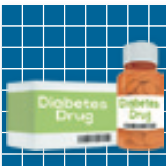Age Influences the Cardioprotective Effects of Diabetes Drugs
Newer diabetes medications known as GLP-1 receptor agonists and SGLT2 inhibitors have been shown to reduce cardiovascular risk, but a recent study suggests their cardioprotective effects may vary in different age groups. In the study, researchers analyzed data from 601 trials, including 103 studies that reported individual patient data on the use of GLP-1 agonists (e.g., dulaglutide, liraglutide and semaglutide), SGLT2 inhibitors (e.g., canagliflozin, dapagliflozin and empagliflozin) and another class of diabetes medications: DPP4 inhibitors (e.g., linagliptin, saxagliptin and sitagliptin). They found that all three drug classes reduced hemoglobin A1c levels (HbA1c, a measure of blood sugar control over the previous three months). Among older study participants, SGLT2 inhibitors lowered HbA1c to a lesser degree but were associated with greater reductions in major cardiovascular events. In contrast, use of GLP-1 receptor agonists was associated with greater HbA1c reductions with increasing age but was more cardioprotective in younger people, the study found (Journal of the American Medical Association, Feb. 3, 2025).






